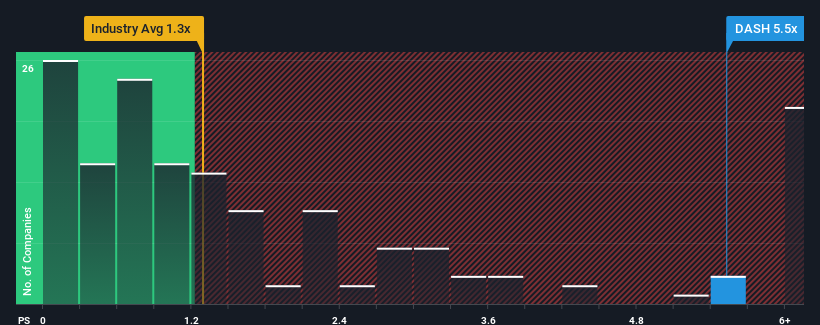- United States
- /
- Hospitality
- /
- NasdaqGS:DASH
DoorDash, Inc. (NASDAQ:DASH) Stocks Shoot Up 25% But Its P/S Still Looks Reasonable

DoorDash, Inc. (NASDAQ:DASH) shares have had a really impressive month, gaining 25% after a shaky period beforehand. The last 30 days bring the annual gain to a very sharp 66%.
Since its price has surged higher, given around half the companies in the United States' Hospitality industry have price-to-sales ratios (or "P/S") below 1.3x, you may consider DoorDash as a stock to avoid entirely with its 5.5x P/S ratio. Nonetheless, we'd need to dig a little deeper to determine if there is a rational basis for the highly elevated P/S.
Check out our latest analysis for DoorDash

What Does DoorDash's P/S Mean For Shareholders?
There hasn't been much to differentiate DoorDash's and the industry's revenue growth lately. Perhaps the market is expecting future revenue performance to improve, justifying the currently elevated P/S. You'd really hope so, otherwise you're paying a pretty hefty price for no particular reason.
Keen to find out how analysts think DoorDash's future stacks up against the industry? In that case, our free report is a great place to start.How Is DoorDash's Revenue Growth Trending?
DoorDash's P/S ratio would be typical for a company that's expected to deliver very strong growth, and importantly, perform much better than the industry.
Taking a look back first, we see that the company grew revenue by an impressive 25% last year. Pleasingly, revenue has also lifted 131% in aggregate from three years ago, thanks to the last 12 months of growth. Therefore, it's fair to say the revenue growth recently has been superb for the company.
Turning to the outlook, the next three years should generate growth of 16% per annum as estimated by the analysts watching the company. With the industry only predicted to deliver 11% per annum, the company is positioned for a stronger revenue result.
With this information, we can see why DoorDash is trading at such a high P/S compared to the industry. Apparently shareholders aren't keen to offload something that is potentially eyeing a more prosperous future.
The Bottom Line On DoorDash's P/S
The strong share price surge has lead to DoorDash's P/S soaring as well. Using the price-to-sales ratio alone to determine if you should sell your stock isn't sensible, however it can be a practical guide to the company's future prospects.
Our look into DoorDash shows that its P/S ratio remains high on the merit of its strong future revenues. At this stage investors feel the potential for a deterioration in revenues is quite remote, justifying the elevated P/S ratio. Unless these conditions change, they will continue to provide strong support to the share price.
It is also worth noting that we have found 2 warning signs for DoorDash that you need to take into consideration.
If these risks are making you reconsider your opinion on DoorDash, explore our interactive list of high quality stocks to get an idea of what else is out there.
New: Manage All Your Stock Portfolios in One Place
We've created the ultimate portfolio companion for stock investors, and it's free.
• Connect an unlimited number of Portfolios and see your total in one currency
• Be alerted to new Warning Signs or Risks via email or mobile
• Track the Fair Value of your stocks
Have feedback on this article? Concerned about the content? Get in touch with us directly. Alternatively, email editorial-team (at) simplywallst.com.
This article by Simply Wall St is general in nature. We provide commentary based on historical data and analyst forecasts only using an unbiased methodology and our articles are not intended to be financial advice. It does not constitute a recommendation to buy or sell any stock, and does not take account of your objectives, or your financial situation. We aim to bring you long-term focused analysis driven by fundamental data. Note that our analysis may not factor in the latest price-sensitive company announcements or qualitative material. Simply Wall St has no position in any stocks mentioned.
About NasdaqGS:DASH
DoorDash
Operates a commerce platform that connects merchants, consumers, and independent contractors in the United States and internationally.
Flawless balance sheet with high growth potential.
Similar Companies
Market Insights
Community Narratives




